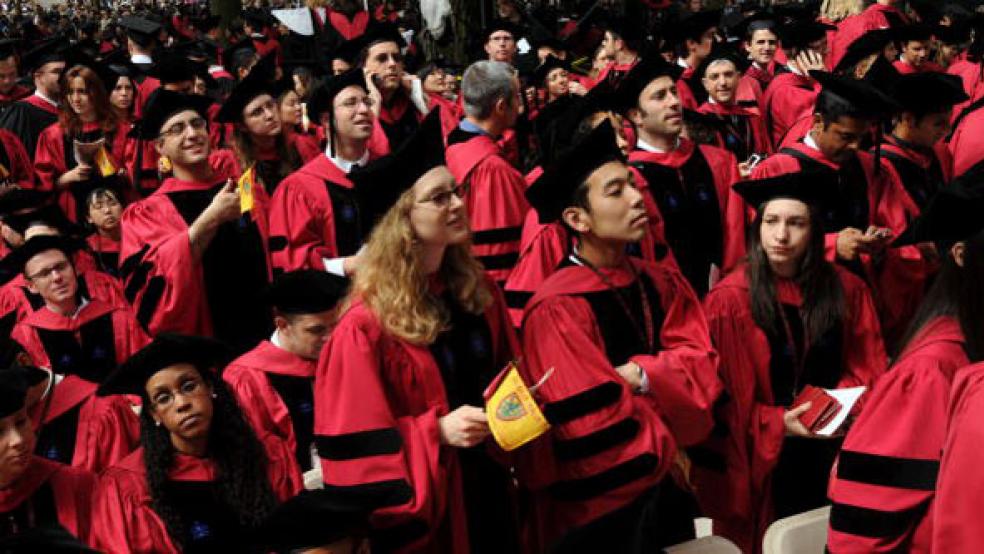The first large-scale study of college graduates' success in life using measures other than salary reached some potentially revolutionary conclusions. It also changed how at least one of the researchers plans to look for future schools for his own children, now ages 3 and 5.
"I have a different way of evaluating colleges now," said Brandon Busteed, executive director for Gallup's education division, which along with Purdue University conducted the poll of 30,000 graduates. "It's not whether the school is private or public or selective or expensive - that doesn't matter."
Related: Controversial College Rankings a Huge Influence
The Gallup-Purdue Index found that elite schools fared no better than less selective private and public schools in ensuring graduates' well-being. The factors that do matter - feeling supported by a professor or mentor and having deep learning experiences - are, at least to some extent, factors that families can search for and control, Busteed said.
"In many ways, it's a very encouraging study for most of America," he said. "It doesn't really matter where you go. It matters how you do it."
The Gallup-Purdue Index builds on three decades' worth of Gallup research on the links between worker happiness, engagement and productivity. Engagement means workers enjoy what they do and feel emotionally and intellectually connected to their jobs. Companies have used the research to boost worker engagement in measurable ways and dramatically reduce costs, Busteed said.
"The biggest misperception is that (workplace engagement and well being) are soft, fluffy measures," Busteed said. "We've shown they are predictive of productivity, of profits and of health care costs."
Related: 10 Best Cities for Today's College Graduates
Busteed called the factors that predict future well-being for graduates "the new college six-pack." Graduates who strongly agreed with any of the following statements were roughly twice as likely to feel engaged at work:
* I had at least one professor who made me excited about learning.
* My professors cared about me as a person.
* I had a mentor who encouraged me to pursue my goals and dreams.
* I worked on a project that took a semester or more to complete.
* I had an internship or job that allowed me to apply what I was learning in the classroom.
* I was extremely active in extracurricular activities and organizations while attending college.
"Any one of them by itself will move the needle," Busteed said. "These six are the game changers."
The more statements that prompted strong agreement, the more likely the graduate felt engaged. Only 3 percent of graduates agreed strongly with all six statements.
Overall, 39 percent of the college graduates polled felt engaged at work. Just 11 percent said they were thriving in five areas related to well-being: purpose (liking what they do), social (friendships and love), community (liking where they live), financial (building financial security and not anxious about money), and physical (being in near-perfect health).
Related: You, Too, Can Get Paid for An Unpaid Internship
Thriving in all five areas "is a very high bar," Busteed said, but a significant number reported struggling in all areas. "What was more shocking to me was that one in six aren't thriving in a single dimension," he said. "You think that might be true of the general population, but these are college graduates."
All this indicates colleges have a long way to go to achieve their often-stated goals of improving graduates' lives in ways other than simply boosting their lifetime income, Busteed said. "When college is done right, it can have a profound effect on people's lives and careers," he said. "It's just not being done right for enough people. ... There is plenty of room for improvement in delivering on their mission statements."
Families don't have to wait for colleges to act to increase their own students' odds of future success, Busteed said. A campus visit can show whether professors regularly interact with students or if they're only to be found in their offices and laboratories. Talking to several students should help families discover if there are a lot of great teachers, or just a few, and how hard or easy it is to access them. The admissions office should be able to detail available extracurricular activities and whether the school helps students find internships.
Once in school, students can take charge of their experience by finding long-term projects and internships, even without the college's help, he said. Most importantly, students can seek out the great teachers and take their courses - even if they're in another discipline.
"Those teachers have reputations (for caring about and mentoring students). The students talk about them," Busteed said. "Select the teacher, not the course."




